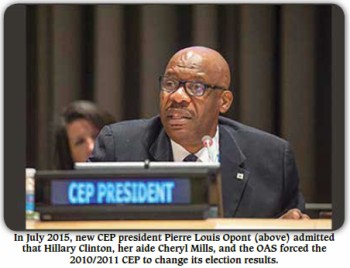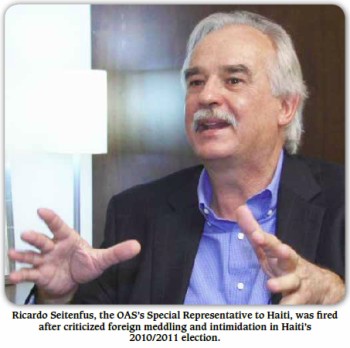|
 In this age of near-total U.S.
government secrecy, the truth about Washington’s actions
is rarely found in the heavily redacted documents it
sometimes releases in response to Freedom of Information
Act (FOIA) requests. It often must be divined from what
remains classified. In this age of near-total U.S.
government secrecy, the truth about Washington’s actions
is rarely found in the heavily redacted documents it
sometimes releases in response to Freedom of Information
Act (FOIA) requests. It often must be divined from what
remains classified.
Such is the case with the 7,945 emails of former
U.S. Secretary of State and now Democratic presidential
candidate Hillary Clinton which the U.S. State
Department has so far made public, on a rolling basis,
since May 2015.
Some 391 of the emails released to date address
or mention Haiti, where there was a devastating
earthquake on Jan. 12, 2010 and presidential elections
in November 2010 and March 2011.
Most of the emails – many heavily redacted – are
terse communications between Clinton and her staff (the
majority from the latter) and are often just the sharing
of press reports.
The most telling and analyzed email so far is a
long report from the Clintons’ daughter, Chelsea. It is
undated but clearly written to Hillary and Bill (and
three Clinton aides) sometime in early 2010 shortly
after the earthquake. The seven page letter harshly
criticizes the earthquake response of the United Nations
(UN) and international non-governmental organizations
(INGOs), noting that the “incompetence is mind numbing,”
that “Haitians want to help themselves and want the
international community to help them help themselves,”
and that “there is NO accountability in the UN system or
international humanitarian system (including for/ among
INGOs).” Chelsea Clinton wrote that the “UN people I
encountered were frequently out of touch...,
anachronistic in their thinking at best and arrogant and
incompetent at worst” and that “Haitians in the
settlements are very much organizing themselves, in part
to help define their needs and then articulate them to
the UN/INGO community.”
The most interesting aspect of Clinton’s Haiti
emails so far, however, is what’s
not there, a
gap in them from Dec. 15, 2010 until Nov. 23, 2012.
What can account for the sudden 23 month break?
An educated guess would be that U.S. censors want
to hide Washington’s intervention and pivotal role in
determining the outcome of Haiti’s sovereign elections
following the first round polling on Nov. 28, 2010.
In December 2010, Haiti’s Provisional Electoral
Council (CEP) had announced that the winners of that
first round were Mirlande Manigat and Jude Célestin, the
candidate of then President René Préval’s party INITE
(Unity). But through the Organization of American States
(OAS) –
dubbed some years ago by the Cuban government
Washington’s “Ministry of Colonial Affairs” – the U.S.
managed to overrule Haiti’s CEP
and have third-place finisher Michel Martelly replace
Célestin in the run-off.
Ricardo Seitenfus, a Brazilian professor of
international affairs who was then the OAS’s Special
Representative in Haiti, called the foreign intervention
an
“electoral coup.”
After publicly expressing his dismay, Seitenfus was
fired.
As the democratic uprising in Egypt was erupting,
Clinton traveled to Haiti on
Jan. 30, 2011 to
pressure Préval’s government to bow to the OAS’s
override of Haiti’s sovereign electoral council. After
brief defiance, Préval folded. Martelly went on to win
the Mar. 20, 2011 run-off, a contest with the record
lowest voter participation (less than 25%) in a
presidential election not just in Haiti but in the
Western Hemisphere since 1945.
Haiti’s CEP, constitutionally the “final arbiter”
of any election,
never agreed with the
election’s results. In July 2015, the 2011
CEP’s director general Pierre Louis Opont,
publicly admitted on
Haitian radio that the Haitian electoral council’s
results had been changed through the intervention of
Hillary Clinton, Clinton aide Cheryl Mills, and the OAS.
The controversial Mr. Opont is now presiding over the
current CEP, which is organizing national municipal,
legislative, and presidential elections. The first round
on Aug. 9 was
plagued by fraud, violence, and
low turnout, and is highly contested.
U.S. Ambassador Pamela White became one of the
Martelly administration’s most fervent cheerleaders,
despite a growing popular uprising against its
corruption, electoral obstructionism, reign of impunity,
and selective arbitrary repression, resulting in Prime
Minister Laurent Lamothe’s resignation in December 2014.
The U.S. Embassy’s strong backing of the
Martelly/Lamothe regime on Clinton’s watch as Secretary
of State, which ended on Feb. 1, 2013, may also explain
why the emails remain classified and hence missing from
the
State Department’s FOIA site.
In the spring of 2011, the media organization
WikiLeaks provided
Haïti Liberté with 2,000 cables – classified from
confidential to secret, dating from April 2003 to
February 2010 – which were obtained through an
unauthorized leak.
Haïti Liberté’s team treating the documents was disappointed to
discover that there were no cables to or from the
Haitian embassy in Port-au-Prince until March 2005, a
full year after the Feb. 29, 2004 coup d’état against
President Jean-Bertrand Aristide. This indicates that
Port-au-Prince Embassy documents from April 2003 to
March 2005 had a higher level of classification such as
“Top Secret” or “Core Secret.” U.S. diplomatic
communications in the months leading up to and
immediately following the 2004 coup therefore remain
secret.
Similar high secrecy around Washington’s agenda
and actions in Haiti in 2011 and 2012 likely explain the
abrupt end to Hillary’s Haiti emails after the November
2010 election.
So, journalists and the American public are left
guessing what Ms. Clinton’s State Department was up to
in Haiti after December 2010, at least until another
unauthorized leak offers a real window into the inner
machinations of the U.S. foreign service.
|